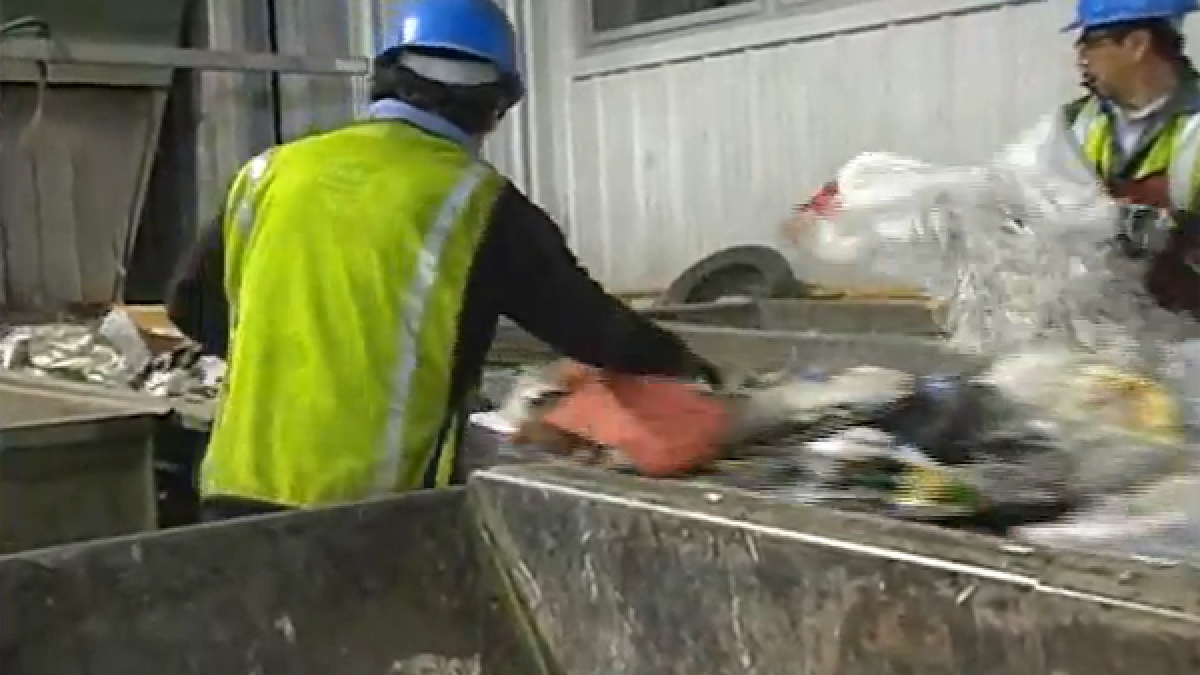Student campaign spreads the word about costly recycling error

Well-meaning Phoenix residents place 33 million plastic bags into recycling bins each year. But doing so does much more harm than good, and a group of ASU students has stepped forward with a public service campaign aimed at educating the community regarding the proper disposal and recycling of plastic bags.
A group of students pursuing the master of arts in communication studies (MACS) degree through ASU’s New College of Interdisciplinary Arts and Sciences created English and Spanish-language videos, instructing the community on how to handle the bags, along with a Facebook page, a Twitter campaign, and an additional video available on YouTube.
The idea for the project came from Majia Nadesan, a New College professor and instructor for the Rhetorical and Critical Approaches to Public Relations course the students just completed. New College is the core college on ASU’s West campus.
In October Nadesan saw an Arizona Republic article about the problems plastic bags cause at Phoenix’s recycling center. The bags cause extra work for employees sorting recyclables; they also get caught in the machinery, causing multiple daily shutdowns and costing the city $1 million a year.
“Originally the students were supposed to write a final paper for the class, but with their consent I decided to change it after reading the Republic article,” Nadesan said. “The students used persuasive strategies introduced in the course to analyze a community problem and create a low-cost solution – a grassroots campaign.”
The campaign is dubbed “Bag It Right.”
“Working on ‘Bag It Right’ was a wonderful and educational experience,” said student Melissa Lopez. “We all learned a great deal about the proper use and recycling of plastic bags and were given the opportunity to make a difference in the community by spreading the knowledge. We were able to utilize our strengths and skills to advocate for this community issue.”
Added fellow student Kelly Liebermann, “After completing this project I have a whole new respect for recycling properly. I had no clue what was involved inside of the recycling plant itself. As one can see from the video, there is a lot of physical labor that goes into the sorting of recyclable materials and the elimination of non-recyclables. I had no idea what an issue plastic bags create for the machinery and the workers every single day.
“City of Phoenix employees were more than willing to help us out in any way possible,” he said. “They were able to answer our questions and share previous plastic bag campaign information to help educate us.”
The video provides details on the proper disposal of plastic bags, including a list of major retailers that accept used bags for recycling. It also explains that the use of plastic bags can be avoided if consumers bring their own cloth bags when shopping.
Nadesan points out that public relations is usually perceived primarily in terms of corporate advocacy. “However, all pressing causes and the organizations behind them need to engage in communicative advocacy,” she said.
The MACS program as a whole features a focus on advocacy, and the recycling project showcases advocacy in action, according to Jeffrey Kassing, faculty director of MACS. “Our graduate faculty and students work hard to explore the intersection of communication and advocacy, and this is a perfect example of how that takes shape. It is exciting to see how the work of MACS students and faculty can bridge the academy and the surrounding community in meaningful and impactful ways,” he said.
One challenging aspect of the “Bag It Right” project, according to student Colleen Dunbar, was reaching out to a very specific audience.
“We were not trying to convince people to recycle,” Dunbar said. “Instead, we tried to convince people who were already recycling that they were recycling these bags in the wrong way – which is not a message that is heard very often. The city was conducting its own campaign on this same issue, so we had to come up with a different way of getting our message across, and getting our message to stick. So far, with just having our videos online for only a few weeks, we seem to be getting a very positive response, and hopefully our message will continue to disseminate.”
The results of the students’ work may be seen at:
http://my.brainshark.com/Bag-it-Right-386496390?v=634897075044706291#.ULZiQQXOqHk.facebook (English)
http://my.brainshark.com/Bols-alo-Bien-702085660?v=634898733063544554#.ULjuDwGJnGU.facebook (Spanish)
https://www.facebook.com/BagItRight